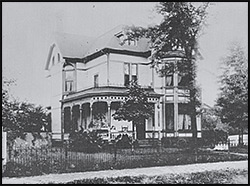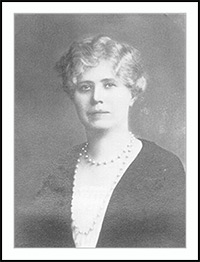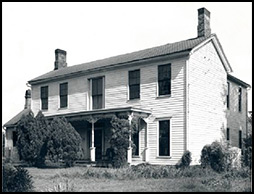Outlook Book Group is a fifteen-member, all women, group based in Henderson, KY, and founded in 1922. Susie Thurman, of Outlook, shares the unusual way their group runs, as well as a secret that she surprised the group with earlier this year!
Hi Susie, I'm so glad you're here! Please tell us a bit about your book group.
Our book club, Outlook, which is based in Henderson, KY, currently has fifteen members (all female), ranging in age from our 50s to late 80s. Each member is hostess once a year and each member reviews a book once a year. Almost always, a member will not choose to both review and host on the same date (I did this a few times, but timing proved to be a problem so I no longer review and host together).
Do you choose the books together?
Members choose the book they will review. Sometimes the book is a surprise, but at other times (especially if a book is newly published) a member will tell us the title she's intending to review, so that no one else who has the same title in mind will waste her time preparing, only to have to change titles.
Some of the books reviewed this year include Lady Almina and the Real Downton Abbey by The Countess of Carnarvon, Spy the Lie: Former CIA Officers Teach You How to Detect Deception by Philip Houston, Michael Floyd, Susan Carnicero and Don Tennant, Cutting for Stone by Abraham Verghese, The Bartender's Tale by Ivan Doig, The Presidents Club: Inside the World's Most Exclusive Fraternity by Nancy Gibbs and Michael Duffy, and Lost in Shangri-La by Mitchell Zuckoff.
I came into Outlook in 1999, and some of the books I have chosen are Lone Woman, Crazy English: The Ultimate Joy Ride Through Our Language by Richard Lederer, The Ohio River by Archer Butler Hulbert, Read It and Eat by Sarah Gardner, Shakespeare: The World as Stage by Bill Bryson, The Guernsey Literary and Potato Peel Pie Society by Mary Ann Shaffer and Annie Barrows, The Know-It-All: One Man's Humble Quest to Become the Smartest Person in the World by A. J. Jacobs, Expanding Horizons (a college textbook I wrote), and Just My Type by Simon Garfield.
Is there something in particular that makes your group different from other groups?
I think our format is different. We don't pick a book, have the whole group read it and then discuss at our book club meetings. Instead, as I began to say above, we take turns reviewing. So one person reads the book and then that same person talks about it at a meeting.
After a review, individuals may or may not read the book. Often, the reviewer brings her copy and offers it to members, who then pass it around to whoever is interested. Most times, though, we have had such an in-depth look at the book that we move on (you know... so many books, so little time).
How did Outlook get started?
When did Outlook get started is a more fascinating question!
I'll bite! When did Outlook get started?
Let me tell you by way of a story. Okay?
Okay!
This year, I deliberately asked to be our first reviewer. As I began, I told our members that I was going to do something unorthodox. Then I said that the story I was going to review was about a group of 16 women who, in 1922, decided to form a literary club in their town. I gave some background about the town. It was a town of some prosperity and was experiencing a building boom, as evidenced by recent newspaper coverage of newly-constructed homes and a newly-opened large downtown church. The town had been in the running to be the home of a new state university but had just learned it had lost the bid. The town was receiving national attention due to a new sporting venue that had opened just before the story began. Also, in the news was the death of a Civil War general who hailed from the town. The town boasted two movie houses.
When the story opens, one is showing the black-and-white silent movie, Bought and Paid For, and the other is showing another black-and-white silent, Beyond the Rocks.
The town, however, was not idyllic. Earlier in 1922, the city commissioners had voted to shutter the two movie houses on Sunday. While this was a controversial move, later in the year the newspaper ran a letter of support for this action; the letter was from the local Ku Klux Klan. A few months later, the front page of the newspaper featured a story about a Klan parade through the downtown area; joining the parade was the local chief of police.
It was against this backdrop that the 16 local women formed their literary club. Many details about the women were not disclosed. For instance, all the married women were referred to only with their husband's name and "Mrs." in front; from the story we never learned their first names. The local newspaper gave glowing accounts of the club. It said that the club "gives promise of being an active addition to the social as well as the literary life of the city. The club will study the countries of the East which are such important factors in the world today: China and Japan, especially, so to America. Once a month they will have a program on the important happening[s] of the day." The club's motto was "Onward we reach the heights."
 The club had a set format, with various members giving reports. For the first meeting, the topics were these:
The club had a set format, with various members giving reports. For the first meeting, the topics were these:
Topsy-Turvy Ways in China.
China, the Long-Lived Empire - Mrs. Clay.
Characteristics of the People - Mrs. Posey.
Natural Resources - Mrs. King.
Great Rivers and Grand Canal.
Current Events.
Pictured right: Alice Dorsey, a teacher and founding member of Outlook
I love the topics!
So did the town! In the next week's society column, the newspaper reported that the first meeting of the club "was a most entertaining one." After the program, coffee and sandwiches were served.
Later in the story, we learn that the women broadened the book group's scope to include individual books and a play:
I talked about the time period in which the story is set. All of the women lived within a couple of miles of each other, but this was 1922, and we weren't told how they got to meetings. Did they still have horses and buggies? The town had a trolley system, but would they have felt it beneath them to ride a trolley? Automobiles had come to their town, but did the women drive or did they have drivers? The women would have been eligible to vote in their first presidential election a couple of years earlier. Did they exercise their suffrage? We know from the topics they chose to discuss that they were interested in current events. Had they been suffragettes before they won the right to vote? Also, Prohibition was in effect, but moonshine was available. How did they feel about being denied liquor legally? And that sporting venue that had just opened—did the women ever attend it?
At about this point of telling my "story," I told the Outlook members that I had a confession. This was not a story at all, but rather a history of our Outlook ancestors.
Wow!
Then I brought out little packets for each member. The packets contained copies of newspaper accounts of what was happening in Henderson in 1922-23 and of the society-page clippings that related to the formation and subsequent first-year meetings of the club.
Below, left: The Redmen home, where Outlook met
 Then we discussed the local events that had occurred in 1922-23 that were detailed in their packets. The women recognized the newly built houses that had been in the paper (they're all still standing, and we know the people who live in them); several of the women attend the church that had been featured in the paper. The sporting venue that had just opened was a horseracing track (still in existence, now called Ellis Park). The Civil War general was the confederate general Stovepipe Johnson, a man who grew up in Henderson (and later conducted a raid here). He also staged a famous raid in Newburgh, Indiana, just up the Ohio River (getting his nickname "Stovepipe" by convincing people in Indiana into thinking cannons were pointed at them; the Hoosiers surrendered to him only to find out that the cannons were really stove pipes resting against charred logs).
Then we discussed the local events that had occurred in 1922-23 that were detailed in their packets. The women recognized the newly built houses that had been in the paper (they're all still standing, and we know the people who live in them); several of the women attend the church that had been featured in the paper. The sporting venue that had just opened was a horseracing track (still in existence, now called Ellis Park). The Civil War general was the confederate general Stovepipe Johnson, a man who grew up in Henderson (and later conducted a raid here). He also staged a famous raid in Newburgh, Indiana, just up the Ohio River (getting his nickname "Stovepipe" by convincing people in Indiana into thinking cannons were pointed at them; the Hoosiers surrendered to him only to find out that the cannons were really stove pipes resting against charred logs).
I don't think the women were aware of the KKK activity, so that was interesting to them.
Below: Mary Ann Redman, a founding member of Outlook; and the Kimmel Homestead where Outlook also met.
 What was most interesting, however, was the list of the women who began the club. I had spent six weeks going through old local reference material, and I was able to find the first names, addresses, and, in some cases, death dates of the founders of Outlook. In one case, I realized that one of the members was the grandmother of a friend of mine, and his mother is still living (she must be in her late 80s now). I called her and was able to get some tidbits about some of the founding women.
What was most interesting, however, was the list of the women who began the club. I had spent six weeks going through old local reference material, and I was able to find the first names, addresses, and, in some cases, death dates of the founders of Outlook. In one case, I realized that one of the members was the grandmother of a friend of mine, and his mother is still living (she must be in her late 80s now). I called her and was able to get some tidbits about some of the founding women.
How amazing!
Of special interest to me was that one of the founding members (Sibella Kimmel) was the sister of Husband Kimmel, who was the naval officer in charge of Pearl Harbor when it was attacked in 1941. Later in its first year, Outlook conducted lengthy studies of Japan, and every time I read about those studies, I couldn't help thinking about how that country would affect Sibella's brother (Sibella died in the 1930s, so she was not alive for the attack).
 In the packet, I also included a couple of newspaper accounts of Outlook meetings from 1942 (twenty years after the founding) and 1962 (40 years after the founding). By 1982, this type of reporting had left the society page, so I did not have information from that time or from subsequent years.
In the packet, I also included a couple of newspaper accounts of Outlook meetings from 1942 (twenty years after the founding) and 1962 (40 years after the founding). By 1982, this type of reporting had left the society page, so I did not have information from that time or from subsequent years.
You must have blown your fellow book group members AWAY with all of this information!
I think I managed to surprise them all.
Outlook certainly has a rich and long history. What a unique thing to be connected to such a long-standing organization.
Can you tell us a little more about your current group? Tell us about your meetings.
Well, as I mentioned earlier, each member is both hostess and reviewer once a year. We ask questions about the book after the review has been completed. On occasion, a reviewer will have printed reading guide questions that she has found on the Internet, but usually this is not the case. After the review is completed we have a sit-down dinner. We have many excellent cooks, although I'm not one of them.
Can you tell us about the sort of books you read?
We're eclectic. I prefer to review nonfiction, as that way I tend to find more information to use as background in handouts. Others are just as likely to review fiction one year and nonfiction the next.
Are there any books that bombed?
Reviewers have rarely (I can remember only once) given a book a bad review. Almost always, someone chooses a book she thinks has merit and will be easy to review.
Have the types of books you've read changed over time?
Our Outlook ancestors choose to read books that were best sellers in 1923, and sometimes we do the same thing…
So things are kind of the same as they were in 1923!
I guess so!
Do you ever see each other outside of meetings?
Several of us are friends who are in dinner club together, some go to the same church, some are members of other organizations. The Garden Club, for instance, comes to mind.
Is there anything else you would like to share?
I should add that, in the summer, some of us choose to have a book club with the regular format of all reading the same book. We meet once a month (this time at lunch, with the hostess providing bread and drinks and others volunteering for salad or dessert) in June, July, and August. In our last regular meeting (usually in April), we decide what three books we'll read during the summer. Several people will bring a list of possibilities, and we just hash it out from there.
Thank you so much for sharing all of this, Susie. I hope Outlook is around for another 10 years. - you'll be able to celebrate its 100 year anniversary! I hope Outlook is around, in fact, for many, many years to come...
Interview conducted by Tamara Smith






Great literature cannot grow from a neglected or impoverished soil...
Click Here to find out who said this, as well as discovering other famous literary quotes!
Your guide toexceptional books
BookBrowse seeks out and recommends the best in contemporary fiction and nonfiction—books that not only engage and entertain but also deepen our understanding of ourselves and the world around us.